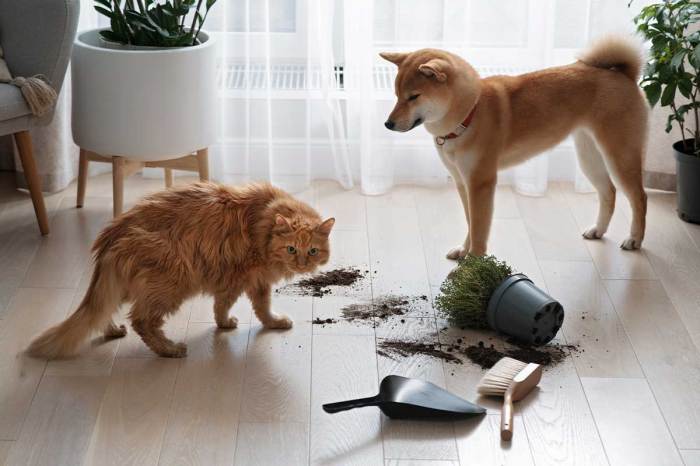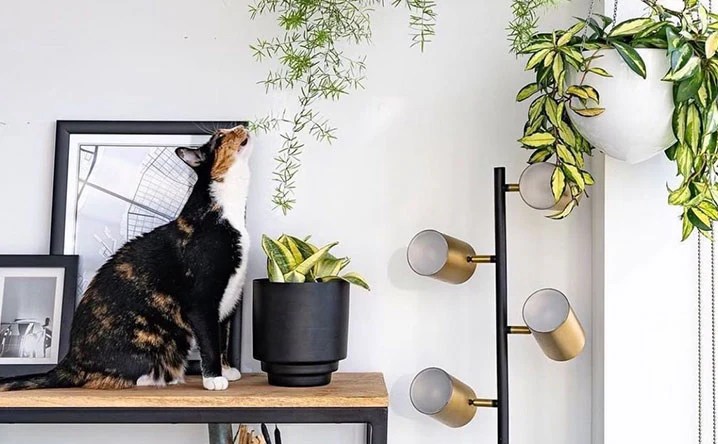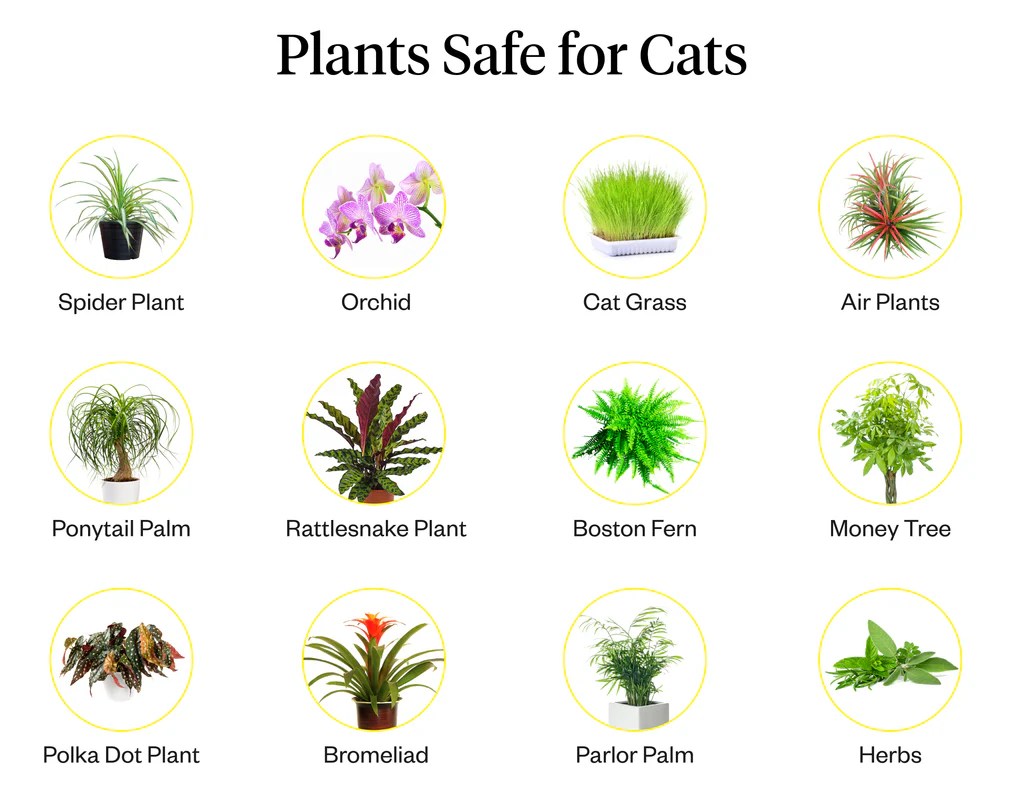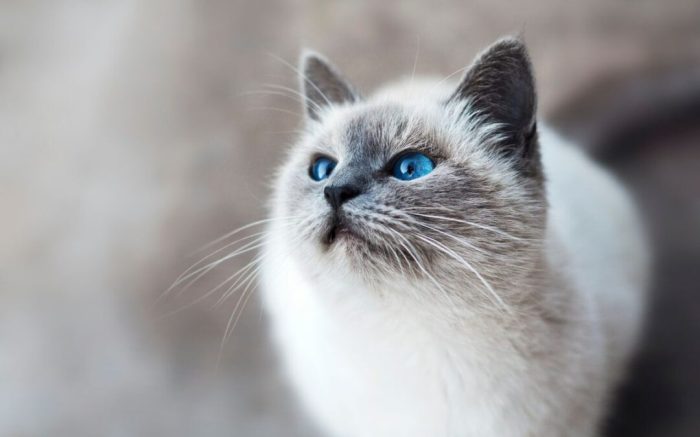When it comes to beautifying your home with greenery, it’s essential to consider the safety of your feline companions. Certain plants can be toxic to cats, posing potential health risks. This guide explores what hanging plants are safe for cats, providing a comprehensive list of non-toxic options that will enhance your home décor without endangering your furry friends.
From lush ferns to trailing vines, discover a variety of hanging plants that are both aesthetically pleasing and safe for your feline family members. We’ll also delve into tips for creating pet-friendly hanging basket arrangements and offer practical advice on caring for your plants in a cat-friendly manner.
Non-Toxic Plants for Feline Companions
Creating a safe and stimulating environment for your feline friend is essential for their well-being. While some plants can be toxic to cats, there are many non-toxic hanging plants that can add a touch of greenery and enrichment to your home.
When choosing hanging plants for your cat, it is important to select species that are known to be non-toxic. Some of the most popular and readily available non-toxic hanging plants for cats include:
Spider Plant (Chlorophytum comosum)
- This easy-to-care-for plant is a great choice for cat owners. It is non-toxic to cats and can help to purify the air in your home.
- Spider plants produce long, trailing stems with small, spider-like plantlets that can be easily propagated to create new plants.
Peperomia (Peperomia spp.)
- Peperomia plants come in a variety of shapes and sizes, making them a versatile choice for any home.
- They are non-toxic to cats and are known for their hardiness and low maintenance requirements.
African Violet (Saintpaulia ionantha), What hanging plants are safe for cats
- African violets are known for their beautiful, velvety flowers that come in a wide range of colors.
- They are non-toxic to cats and are a popular choice for indoor gardening.
Ferns (Nephrolepis exaltata, Boston fern)
- Ferns are a great way to add a touch of elegance to your home.
- They are non-toxic to cats and can help to improve air quality.
Air Plants (Tillandsia spp.)
- Air plants are unique in that they do not need soil to grow.
- They are non-toxic to cats and can be attached to a variety of surfaces, making them a great choice for small spaces.
By choosing non-toxic hanging plants for your cat, you can create a safe and enriching environment for your feline friend while adding a touch of greenery to your home.
Identifying Toxic Plants and Their Effects
Cats are curious creatures that may nibble on plants, putting them at risk of ingesting toxic substances. Identifying and avoiding these harmful plants is crucial for feline health.
When it comes to adding greenery to your home while ensuring the safety of your feline friends, it’s crucial to choose hanging plants that are non-toxic to cats. Various options include spider plants, air plants, and ferns. If you’re looking for a stylish way to display these plants, consider using fence hanging pots from Bunnings.
These pots can be easily attached to fences or walls, providing a space-saving and aesthetically pleasing solution. By choosing cat-friendly hanging plants and utilizing fence hanging pots, you can create a lush and inviting environment for both your pets and yourself.
The following list includes common hanging plants that are toxic to cats, along with their toxic components and potential symptoms:
Toxic Hanging Plants
- Pothos (Devil’s Ivy): Contains insoluble calcium oxalates, causing oral irritation, vomiting, and difficulty swallowing.
- Philodendron: Also contains insoluble calcium oxalates, leading to similar symptoms as pothos.
- String of Pearls: Contains saponin, which can irritate the digestive tract and cause vomiting, diarrhea, and lethargy.
- Spider Plant: Contains mild toxins that can cause mild gastrointestinal upset, such as vomiting or diarrhea.
- Peace Lily: Contains insoluble calcium oxalates, similar to pothos and philodendron.
Pet-Friendly Hanging Basket Arrangements: What Hanging Plants Are Safe For Cats

Creating a harmonious living space for both cats and their human companions requires careful consideration. Hanging baskets offer a creative solution to provide a safe and enriching environment for feline friends while adding a touch of greenery to the home.
By incorporating non-toxic plants and employing creative design techniques, pet owners can create stunning hanging baskets that cater to the needs of both species.
Hanging baskets provide several benefits for cats. They create vertical space, allowing cats to climb and explore, which satisfies their natural instincts. The elevated position also provides a sense of security and allows cats to survey their surroundings. Additionally, the foliage can provide hiding spots and sensory stimulation, contributing to their overall well-being.
Plant Selection
When selecting plants for hanging baskets, it is crucial to choose non-toxic varieties to ensure the safety of cats. Some recommended options include:
- Spider plants
- Catnip
- Valerian
- Prayer plants
- Baby’s tears
Design Considerations
To create visually appealing and cat-friendly hanging baskets, consider the following design principles:
- Complementary colors:Choose plants with contrasting or complementary foliage colors to create a visually striking display.
- Varying textures:Incorporate plants with different leaf shapes and textures to add depth and interest.
- Hanging height:Suspend baskets at a height that allows cats to access the plants easily but prevents them from knocking them over.
Maintenance
Regular maintenance is essential to keep hanging baskets healthy and attractive. Water plants according to their individual needs, and fertilize them monthly during the growing season. Prune any dead or overgrown leaves to maintain a tidy appearance.
When selecting hanging plants for cat owners, safety is paramount. Opt for non-toxic varieties like spider plants, ferns, and air plants. To display these feline-friendly greens, consider stylish wall hanging planters from wall hanging planter bunnings . These space-saving solutions elevate your home décor while providing a safe haven for your furry friend’s botanical companions.
By following these guidelines, pet owners can create beautiful and safe hanging baskets that enhance the living environment for both cats and their human companions.
DIY Cat-Friendly Plant Care

Ensuring the well-being of both your feline companions and your hanging plants requires a delicate balance. Here’s a comprehensive guide to help you navigate the world of cat-friendly plant care, offering practical tips and guidance to keep your plants thriving and your cats safe.
When considering hanging plants for your home, it’s important to ensure they are safe for your feline companions. While some plants can be toxic to cats, there are many beautiful and safe options available. For a wide selection of hanging plants suitable for both your cats and your home decor, explore plants for hanging baskets bunnings . Their collection includes a variety of cat-friendly options, so you can enjoy the beauty of hanging plants without worry.
Watering Techniques
When watering hanging plants, avoid overwatering, as this can lead to root rot and attract pests. Instead, allow the soil to dry out slightly between waterings. Use room-temperature water and avoid getting water on the leaves, as this can promote fungal growth.
Fertilization Schedules
Fertilize hanging plants sparingly, using a balanced liquid fertilizer diluted to half strength. Over-fertilizing can burn plant roots and harm cats if ingested. Follow the instructions on the fertilizer label carefully and avoid using fertilizers containing bone meal or blood meal, which can be toxic to cats.
Pest Control Methods
To control pests without harming cats, opt for natural methods such as insecticidal soap, neem oil, or horticultural oil. Avoid using chemical pesticides, as these can be highly toxic to cats. If pests persist, consult a veterinarian or pest control professional for advice on safe and effective treatment options.
Recognizing and Addressing Plant-Related Health Issues
Observe your cats closely for any signs of plant-related health issues, such as vomiting, diarrhea, or skin irritation. If you suspect your cat has ingested a toxic plant, contact your veterinarian immediately. Induce vomiting or administer activated charcoal to absorb the toxin, but do not give your cat milk, as this can worsen the situation.
Educational Resources and Further Exploration

Empowering pet owners with knowledge is crucial for fostering a safe and harmonious environment for both cats and plants. Reputable sources provide invaluable information on plant toxicity and feline safety, guiding responsible pet ownership.
The following resources offer comprehensive insights into cat-friendly plants and potential hazards:
Websites
- ASPCA Animal Poison Control Center: Provides a searchable database of toxic and non-toxic plants for pets.
- Pet Poison Helpline: Offers a 24/7 hotline and online database for pet poisoning emergencies.
- Cornell University College of Veterinary Medicine: Maintains a comprehensive list of toxic and non-toxic plants for cats.
Books
- “Poisonous Plants for Cats”by Richard Palmquist: A detailed guide to identifying and avoiding toxic plants.
- “The Cat Owner’s Manual”by David Taylor: Includes a chapter on cat-friendly plants and potential hazards.
Organizations
- American Society for the Prevention of Cruelty to Animals (ASPCA): Provides resources on pet safety, including plant toxicity.
- Pet Poison Control Center (PPCC): Offers educational materials and poison prevention tips for pet owners.
- National Animal Poison Control Center (NAPCC): Provides 24/7 emergency support and information on animal poisoning.
By accessing these resources, pet owners can stay informed about plant safety and make informed decisions when selecting plants for their homes, ensuring a safe and healthy environment for their feline companions.
End of Discussion

By choosing non-toxic hanging plants, you can create a harmonious living space where both you and your cats can thrive. Remember to consult with a veterinarian or reputable resources for more detailed information and guidance on plant toxicity and feline safety.
Happy planting!
FAQ Corner
Are all hanging plants safe for cats?
No, some hanging plants contain toxic components that can be harmful to cats. It’s crucial to choose non-toxic varieties to ensure your feline companion’s safety.
What are some common non-toxic hanging plants for cats?
Some popular non-toxic hanging plants for cats include spider plants, ferns, and air plants. These plants are known for their air-purifying qualities and can add a touch of greenery to your home without posing a threat to your cat.
How can I create a cat-friendly hanging basket arrangement?
To create a cat-friendly hanging basket arrangement, choose a variety of non-toxic plants with complementary colors and textures. Consider using a sturdy hanging basket that can withstand your cat’s playful antics and place it out of reach of their paws.